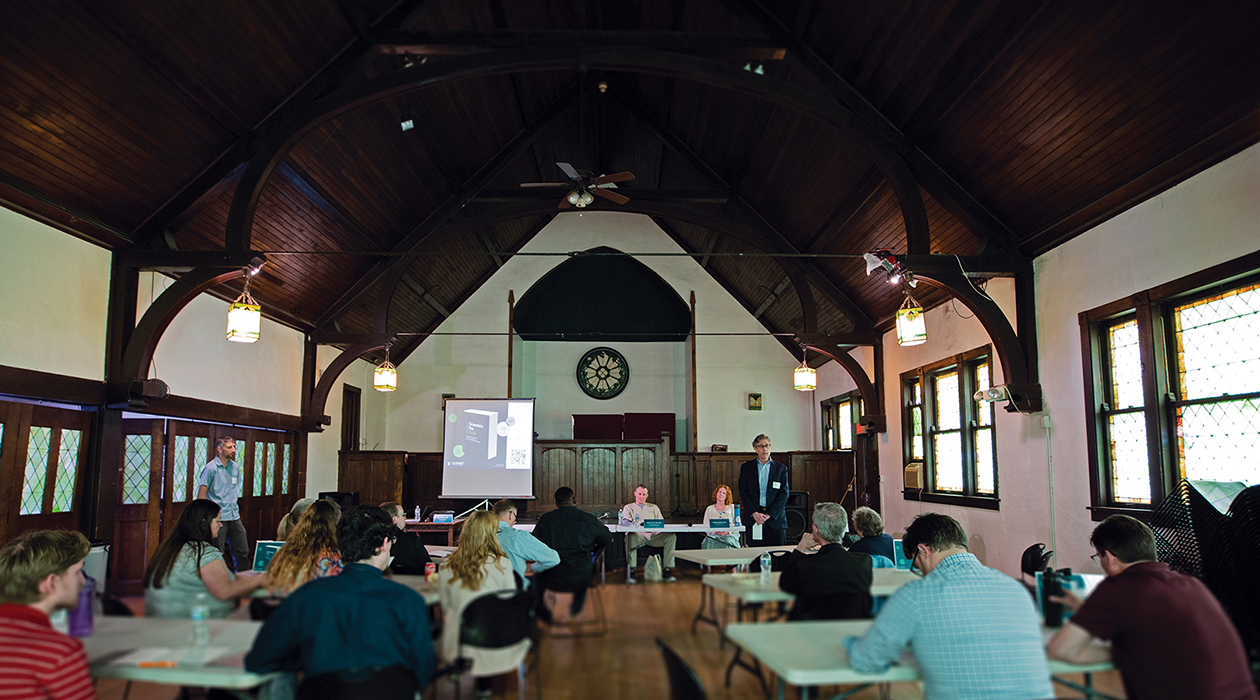Genomics for Faith kicks off, connecting scientists and faith members in the community

IGB Director Gene Robinson introduces the Genomics for Faith panel, which included Christina Laukaitis, clinical associate professor of medical genetics and medical doctor at Carle Illinois College of Medicine, Michael Aref, Assistant Medical Director of Palliative Medicine at Carle Hospital, and Melanie Sheckels, threshold doula and hospice nurse. / Mirhee Lee
Scientific and technological advancements, particularly in the area of genomics research, continue to penetrate nearly all areas of society. Yet most of the public do not have access to the knowledge or tools necessary to understand how this new research may affect them, both in their lives and in their careers. As such, Genomics for Professionals, otherwise known as Genomics forTM, was developed as a series of educational programs designed to teach basic concepts in biology and genomics to professionals within different public sectors. These seminars also provide a space for questions and discussions with scientists regarding the impact genomics may have in their particular sector. The program has already successfully collaborated with many sectors over the years, including judges, lawyers, clinicians, journalists, police officers, and more.
A new program within the series debuted on May 17th at the Channing-Murray Foundation, where a crowd of scientists, faith leaders, and faith-holding members of the community gathered for a fruitful discussion regarding ‘what is life?’, ‘what does it mean to be alive?’, and ultimately, ‘what is death?’. Participants were able to ask questions to a panel of three community members with diverse experiences: Christina Laukaitis, a clinical associate professor of medical genetics and medical doctor at Carle Illinois College of Medicine, Michael Aref, the Assistant Medical Director of Palliative Medicine at Carle Hospital, and Melanie Sheckels, a threshold doula and hospice nurse.
Gene Robinson, IGB Director, gave opening remarks at the start of the session, explaining the inspiration behind Genomics for Faith:
“When you step back, there are two groups of people in our society that the public turns to for trusted information, and that is scientists, and faith leaders,” said Robinson. “As the situation exists now, those two groups don't talk to each other very much. We would like with your partnership to change that, and today we enter with a spirit of humility. We're here to explore with you our shared passion for the search for the truth.”
Daniel Urban, the IGB’s Senior Outreach Activities Coordinator, gave a short presentation to introduce the topic of discussion for the day, jokingly stating “We thought we’d start off with something small and simple to ease ourselves in this, so we settled on the topic: ‘What is life?’
“A lot of people have this impression that scientists have the answers to everything,” Urban continued. “I'm sure many of you will be shocked to find out that we don't have it all quite nailed down just yet, especially with today’s question.”
After a short presentation on the science, the floor was opened for discussion on the meaning of life and death. The panel and audience members shared unique perspectives on the topic, which stemmed from various experiences, faiths, and backgrounds in science. Some of the questions asked included how to talk about death, what counts as someone being alive versus dead, and does life go beyond death. Conversations also arose regarding how one’s view of what life means to them shapes where they draw the line of when life ends.
The event’s organizers say the goal of Genomics for Faith is to provide a safe space to have discussions where personal beliefs and scientific information intersect. “As a society we face many daunting challenges,” said Claudia Lutz, the IGB’s Outreach Manager and one of the lead organizers of the event.
“The recent pandemic was a reminder of what a powerful and positive impact institutions of faith can have on communities by providing information and guidance. We hope to find areas of common ground and collaboration with faith communities so that both science and faith practitioners are even better positioned to help our society face current and future challenges.”
Currently, the IGB is planning future Genomics for Faith sessions to branch into other topics of interest that lean more heavily into genomics research, such as the role of stem cells in health, and genome editing techniques. Organizers of the forum are also considering new methods of engagement and interactions within Genomics for Faith that will allow participants to have a more open-ended and free-form experience. Members of all faith communities are welcome to attend in the future, and sessions are free. If anyone has feedback regarding the last session, or has ideas for future sessions, they can email Lutz at cclutz2@illinois.edu.
